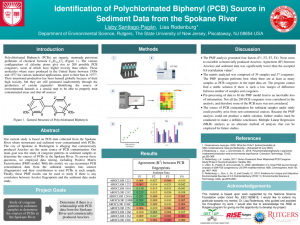Santiago, Lisby: Identification of Polychlorinated Biphenyl (PCB) Source in Sediment Data from the Spokane River
Title: Identification of Polychlorinated Biphenyl (PCB) Source in Sediment Data from the Spokane River
Name: Lisby Santiago
Home Institute: University of Puerto Rico, Río Piedras
Programs: RISE Program, REU – Green Energy Technology Undergraduate Program (GET UP)
Other contributors: Lisa Rodenburg
Abstract: Polychlorinated Biphenyls (PCBs) are organic, manmade persistent pollutants. These molecules where mass-produced in the United States between the 1930s and 1977 for various industrial applications, prior to their ban in 1979. Their intentional production has been banned globally because of their high toxicity, but they are still generated unintentionally through the production of certain pigments. With our research, we study the sources of these contaminants, as well as their fate and transport. Identifying the source of environmental hazards is a crucial step to be able to properly treat contaminated areas and shut off sources. Our current study is based on PCB data collected from the Spokane River where stormwater and sediment were contaminated with PCBs. The city of Spokane in Washington is alleging that commercially produced Aroclors are the main source of PCB contamination. Our main goal was the study of congener patterns in sediment samples to determine the sources of PCBs in the Spokane River. To answer these questions, we employed data mining, including Positive Matrix Factorization (PMF) model. With this model, we can reconstruct PCB concentration data from the sediment samples into sources (fingerprints) and their contributions to total PCBs in each sample. Finally, these PMF results can be used to study if there is any correlation between Aroclor fingerprints and the sediment data under study.
Biography: Lisby Santiago Pagán is an undergraduate student from the University of Puerto Rico, Río Piedras Campus. Santiago is majoring in Chemistry and is also an active researcher in an analytical chemistry laboratory, where she specializes in environmental science projects. Besides immersing herself in her research, Lisby enjoys dedicating her time tutoring organic chemistry students. Her love for teaching others and her passion for science are some of the factors that led her to want to pursue a Ph.D. in analytical chemistry. Santiago is a member of the Research Initiative for Student Enhancement (RISE) program, a program that incorporates research, mentoring, and career development to promote the Ph.D. programs in biomedical fields. Considering recent tropical events that have affected Puerto Rico, it is with great satisfaction and purpose that Lisby dedicates her time to working on projects that are of great contribution to the environment. As a minority student in a country that has been through so much hardship these past years, science is the way for her to channel her energies and passion and contribute her talents to impact our society.
